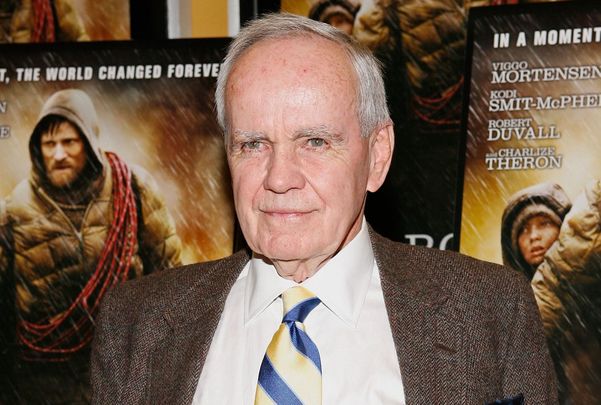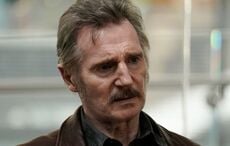Cormac McCarthy died of natural causes at his home in Santa Fe, New Mexico, according to a statement from publisher Penguin Random House, which cited his son, John McCarthy.
Known for his dark, visceral storytelling and poetic prose, Cormac McCarthy captivated readers with his unique vision of the American landscape and the human condition. Behind the veil of mystery that shrouded him, lay a remarkable heritage of Irish ancestry, an incredible career and a prolific body of work, including "The Road", "No Country For Old Men", and "Blood Meridian".
Cormac McCarthy was born Charles McCarthy Jr. on July 20, 1933, in Providence, Rhode Island. He adopted the name Cormac early in his writing career. McCarthy's ancestors hailed from County Cork, a region known for its rugged landscapes that mirror the themes often explored in his works. The influence of his Irish heritage is evident in his vivid storytelling, infused with a sense of longing, tragedy, and a deep connection to the land.
Ode to humanity's struggles
McCarthy's literary oeuvre spans over five decades, and each of his works stands as a testament to his exceptional talent. One of his most celebrated novels is "Blood Meridian" (1985), a violent and hauntingly poetic tale set in the 1850s American West. "All the Pretty Horses" (1992), the first installment of his Border Trilogy, won the National Book Award and established McCarthy as a formidable force in American literature.
His magnum opus, "The Road" (2006), a post-apocalyptic masterpiece, earned him the Pulitzer Prize for Fiction. Through sparse yet evocative prose, McCarthy explores themes of morality, the human struggle for survival, and the intrinsic nature of evil, leaving readers grappling with existential questions long after the final page.
Silver screen success
McCarthy's novels also had huge success being adapted as movies. In fact, "Blood Meridian" is currently in production with Luca Guadagnino set to direct and a talented ensemble cast, including James Franco.
In 2000 Billy Bob Thorton directed an adaptation of "All The Pretty Horses" starring Matt Damon and Penelope Cruz. While the film received mixed reviews, their performances added to the film's allure, even if it didn't achieve the same level of success as McCarthy's other adaptations.
"No Country for Old Men" (2007), directed by Joel and Ethan Coen and starring Javier Bardem, Josh Brolin, and Tommy Lee Jones won four Academy Awards, including Best Picture, and solidified McCarthy's place in the realm of literary-to-film adaptations.
Two years later, "The Road" (2009), directed by John Hillcoat, and starring Viggo Mortensen and Robert received widespread praise. While it wasn't a major box office success, it garnered critical appreciation for its emotional depth and haunting atmosphere.
Back in 2013, James Franco took on the challenging task of adapting McCarthy's grim novel "Child of God." The film delves into the disturbing life of Lester Ballard, a socially isolated and morally corrupt individual. Although the movie had a limited release and received mixed reviews, Franco's commitment to capturing McCarthy's dark vision and Scott Haze's haunting portrayal of Lester Ballard were notable.

Looking for Irish book recommendations or to meet with others who share your love for Irish literature? Join IrishCentral’s Book Club on Facebook and enjoy our book-loving community.
A rare glimpse into the enigma
McCarthy was known for his reclusive nature, rarely making public appearances or granting interviews. However, there have been a few notable exceptions that have offered a glimpse into the mind behind the words.
In 2008, he appeared on "The Oprah Winfrey Show," which surprised many, as McCarthy had previously shunned the media spotlight. This interview provided a rare opportunity for fans to witness the author's contemplative and introspective nature. McCarthy's appearance shed light on his writing process, his aversion to fame, and the deep well of empathy that underlies his gritty narratives.
Illuminating the human condition
McCarthy's prose is replete with profound insights that capture the essence of the human condition. His words possess an elemental power, resonating with readers and leaving an indelible imprint. One of his most notable quotes comes from "No Country for Old Men" (2005): "You never know what worse luck your bad luck has saved you from." This line encapsulates the tragic nature of life and the unpredictable nature of fate.
In "The Road," McCarthy offers a poignant reflection on resilience: "You forget what you want to remember, and you remember what you want to forget." This quote explores the fragility of memory and the human capacity to endure in the face of unimaginable adversity.
Another striking quote from McCarthy's repertoire can be found in "All the Pretty Horses": "Scars have the strange power to remind us that our past is real." This line speaks to the profound impact of experiences, both physical and emotional, and how they shape our identities.
In the realm of literature, few authors possess the power to captivate and provoke thought quite like Cormac McCarthy. His Irish heritage infuses his writing with a sense of longing and tragedy, while his remarkable body of work continues to inspire and challenge readers.




Comments